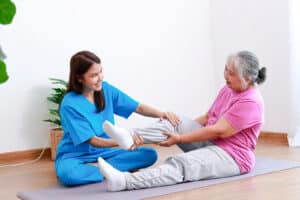
Falls among seniors can have serious consequences, including injuries, hospitalizations, and a loss of independence. Fortunately, many falls can be prevented with proper measures and care. There are a lot of factors that make seniors more likely to experience a fall, including existing injuries and health issues, but tools like physical therapy can help.
Consider Home Modifications
One of the first steps in preventing falls for seniors is to assess and make necessary home modifications. A safe and accessible living environment is crucial in reducing fall risks. Consider installing handrails and grab bars in hallways, staircases, and bathrooms to provide support and stability. Remove tripping hazards such as loose rugs or clutter on the floor. Adequate lighting is also important, especially in hallways, staircases, and other high-traffic areas. Ensure that there are light switches or lamps within easy reach of the bed and in other commonly used spaces.
Organize the Space for Ease of Use
Organizing the living space with seniors in mind can also help prevent falls. Keep frequently used items within reach to avoid unnecessary bending or stretching. Use easy-to-open containers and labels with large, clear print for better visibility. Arrange furniture to create clear pathways and remove obstacles that could cause tripping. Seniors with mobility aids, such as walkers or canes, should have ample space to navigate comfortably. Ensuring that the living space is organized for ease of use can reduce the risk of falls and improve daily living for seniors. Home care providers can help seniors to stay organized and to keep their homes tidy.
Improve Bathroom Safety
The bathroom is an extremely common area for falls due to its slippery surfaces and confined spaces. Improving bathroom safety is crucial for fall prevention. Install non-slip mats or adhesive strips in the bathtub or shower to provide secure footing. Consider using a raised toilet seat to make it easier for seniors to sit down and stand up. Adding grab bars in strategic locations, such as near the toilet and bathtub, can offer essential support when getting in and out of the shower or using the facilities. Additionally, ensure that the bathroom is well-lit to minimize the risk of trips and falls.
Encourage Seniors to Exercise
Regular exercise is a key component in preventing falls for seniors. Engaging in activities that improve strength, balance, and flexibility can significantly reduce the risk of falls. Seniors who have been extremely sedentary or who have experienced injuries in the past might need to consider physical therapy. Working with a physical therapist can allow them to become stronger, improve coordination, and enhance overall mobility. Regular exercise also boosts confidence, which is essential in maintaining an active and independent lifestyle.
Reduce Fall Risk Factors
To prevent falls, it is essential to identify and address individual fall risk factors. Seniors should be mindful of certain medications that may cause dizziness or affect balance and discuss any concerns with their healthcare providers. Regular vision and hearing check-ups are also important for maintaining optimal sensory function, as impaired vision or hearing can increase the risk of falls. Encourage seniors to wear appropriate footwear with non-slip soles and good support. Assess the need for mobility aids, such as canes or walkers, and ensure they are properly adjusted for comfort and stability.
Preventing falls for seniors requires a proactive and comprehensive approach that covers a lot of ground. Addressing environmental factors as well as health factors, including the need for physical therapy, are all important parts of helping to reduce fall risk.
If you or an aging loved one is considering physical therapy in Olney, MD, please contact the caring staff at Care At Home today. 301-970-9706
- 24-Hour Home Care: Special Considerations for Seniors With Dementia - May 9, 2025
- The Best Social Engagement Activities For Seniors At Home - April 25, 2025
- Senior Home Care Makes Chores Easier For Seniors - April 8, 2025
